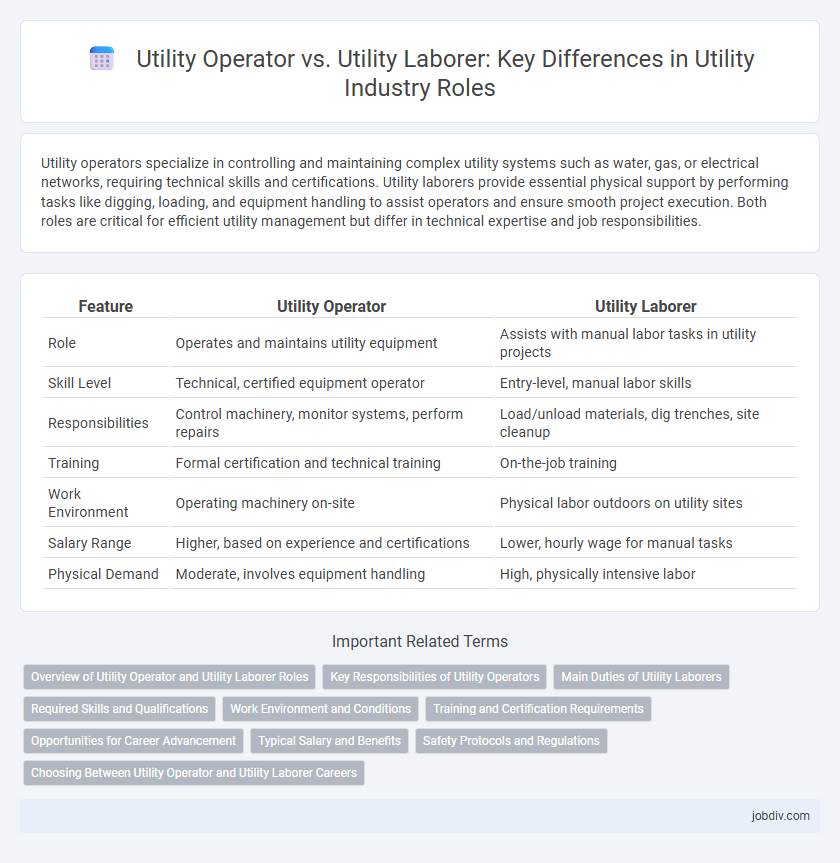Utility operators specialize in controlling and maintaining complex utility systems such as water, gas, or electrical networks, requiring technical skills and certifications. Utility laborers provide essential physical support by performing tasks like digging, loading, and equipment handling to assist operators and ensure smooth project execution. Both roles are critical for efficient utility management but differ in technical expertise and job responsibilities.
Table of Comparison
| Feature | Utility Operator | Utility Laborer |
|---|---|---|
| Role | Operates and maintains utility equipment | Assists with manual labor tasks in utility projects |
| Skill Level | Technical, certified equipment operator | Entry-level, manual labor skills |
| Responsibilities | Control machinery, monitor systems, perform repairs | Load/unload materials, dig trenches, site cleanup |
| Training | Formal certification and technical training | On-the-job training |
| Work Environment | Operating machinery on-site | Physical labor outdoors on utility sites |
| Salary Range | Higher, based on experience and certifications | Lower, hourly wage for manual tasks |
| Physical Demand | Moderate, involves equipment handling | High, physically intensive labor |
Overview of Utility Operator and Utility Laborer Roles
Utility Operators manage and control equipment that distributes essential services like water, gas, and electricity, ensuring system efficiency and safety. Utility Laborers perform manual tasks such as maintaining infrastructure, digging trenches, and assisting with installations to support utility operations. Both roles are critical for the continuous delivery and maintenance of public utility services.
Key Responsibilities of Utility Operators
Utility Operators manage and maintain critical infrastructure systems such as water, gas, and electricity to ensure uninterrupted service delivery. They monitor equipment performance, perform routine inspections, and troubleshoot issues to prevent outages and ensure safety compliance. Utility Operators also oversee system automation controls and coordinate with maintenance teams to optimize operational efficiency.
Main Duties of Utility Laborers
Utility laborers perform essential tasks such as digging trenches, laying pipes, and assisting with the installation and maintenance of utility infrastructure. They handle manual labor that supports utility operators by preparing sites, unloading materials, and ensuring safety compliance during construction or repair work. Their role is critical in facilitating the efficient operation of water, gas, and electrical utility systems.
Required Skills and Qualifications
Utility operators must possess specialized technical skills, including the ability to operate and maintain complex machinery, read blueprints, and understand safety regulations. Utility laborers typically require basic physical skills, manual dexterity, and the capacity to perform repetitive tasks under supervision with minimal formal qualifications. Utility operators often hold certifications or licenses, whereas utility laborers generally need only a high school diploma and on-the-job training.
Work Environment and Conditions
Utility operators typically work in controlled environments such as utility plants or treatment facilities, where safety protocols and machinery operation are paramount. Utility laborers often face more physically demanding and outdoor conditions, including exposure to harsh weather, uneven terrain, and manual handling of heavy materials. Both roles require strict adherence to safety standards, but utility laborers experience more variable and physically intensive work environments.
Training and Certification Requirements
Utility Operators typically require specialized training and certification, including OSHA safety courses, equipment operation licenses, and industry-specific certifications such as NCCER or NACE. Utility Laborers generally undergo basic safety training and on-the-job instruction but do not need extensive certifications or licenses. Employers prioritize certified operators for complex machinery operation, while laborers are valued for physical tasks and supporting roles.
Opportunities for Career Advancement
Utility operators often have greater opportunities for career advancement due to the specialized skills and certifications required for their roles, such as operating complex machinery and managing utility systems. Utility laborers typically start with entry-level tasks that provide foundational experience but may require further training and education to progress into operator or supervisory positions. Investing in certifications like OSHA safety training or technical courses can significantly enhance career growth prospects within the utility industry.
Typical Salary and Benefits
Utility Operators typically earn a higher salary than Utility Laborers, with averages ranging from $50,000 to $70,000 annually depending on experience and location. Utility Operators often receive comprehensive benefits packages, including health insurance, retirement plans, and paid leave, which can be more extensive compared to those offered to Utility Laborers. While Utility Laborers generally earn between $30,000 and $45,000 per year, benefits may be limited or less generous, reflecting differences in job responsibilities and skill requirements.
Safety Protocols and Regulations
Utility operators follow strict safety protocols and regulations that require extensive training for operating heavy machinery and managing hazardous materials. Utility laborers adhere to safety standards focusing on manual tasks, such as excavation and maintenance, using personal protective equipment (PPE) to minimize injury risks. Both roles must comply with OSHA regulations and company-specific safety procedures to ensure a secure work environment.
Choosing Between Utility Operator and Utility Laborer Careers
Selecting between a Utility Operator and a Utility Laborer career depends on skill requirements and job responsibilities within the utility sector. Utility Operators manage and control equipment for water, gas, or electricity distribution systems, requiring technical expertise and certifications. Utility Laborers perform manual tasks such as digging, installation, and maintenance support, offering entry-level opportunities with physical stamina as a key factor.
Utility Operator vs Utility Laborer Infographic

 jobdiv.com
jobdiv.com